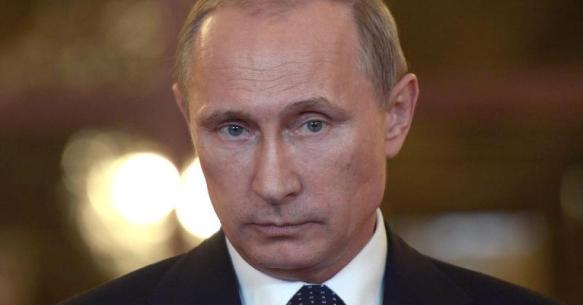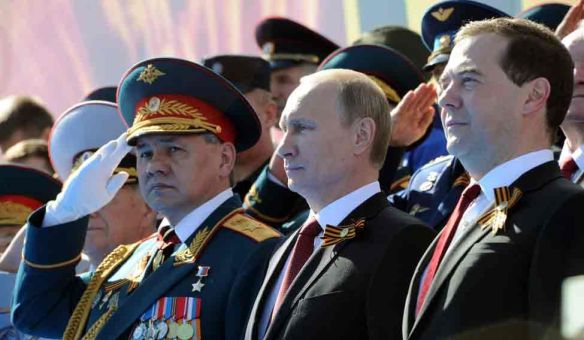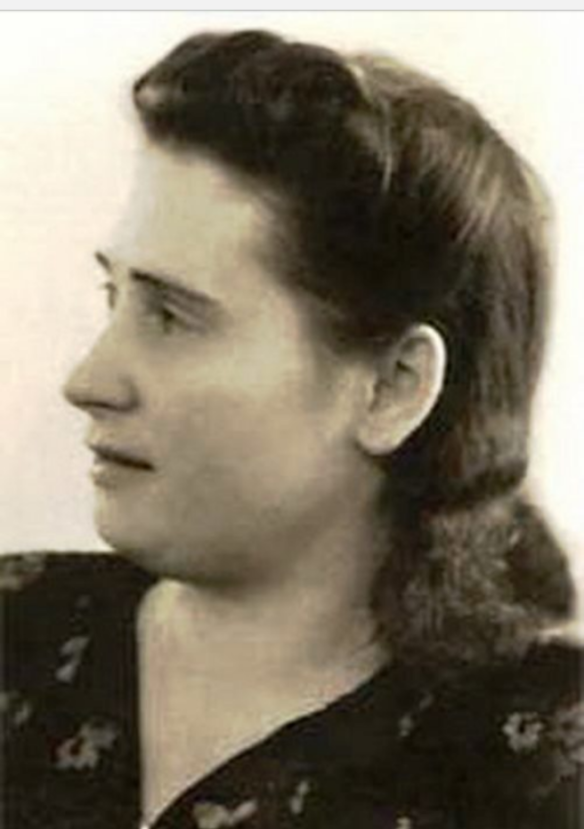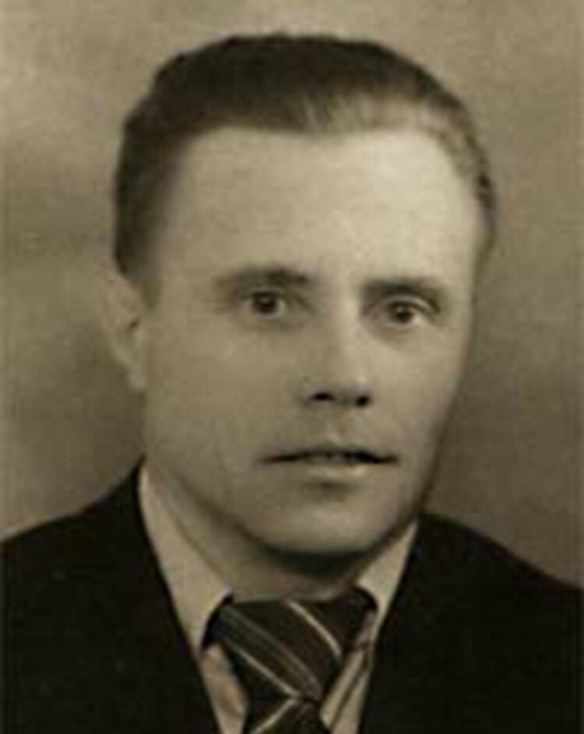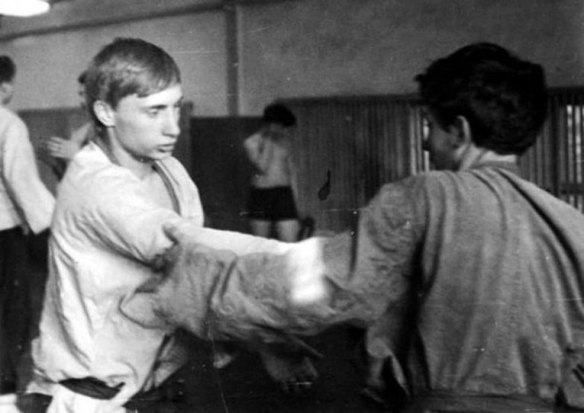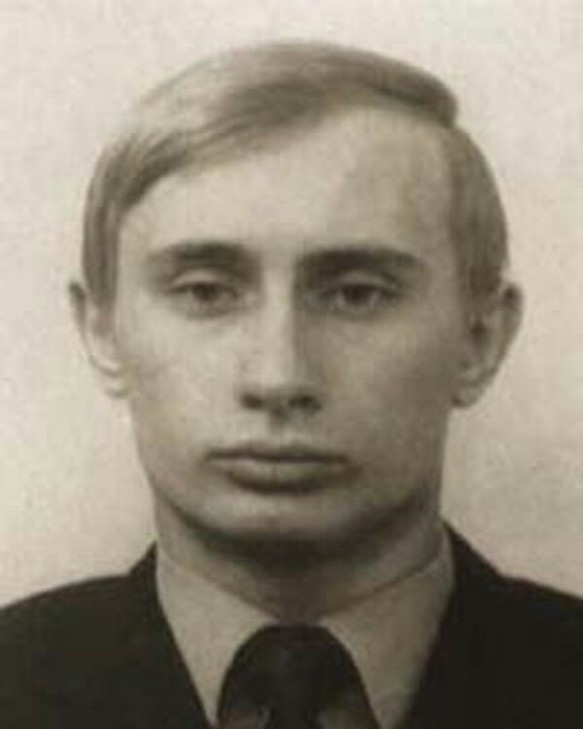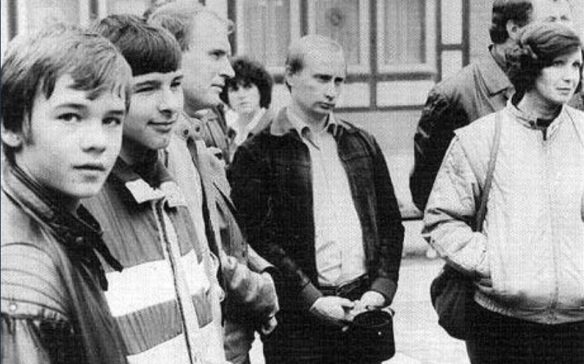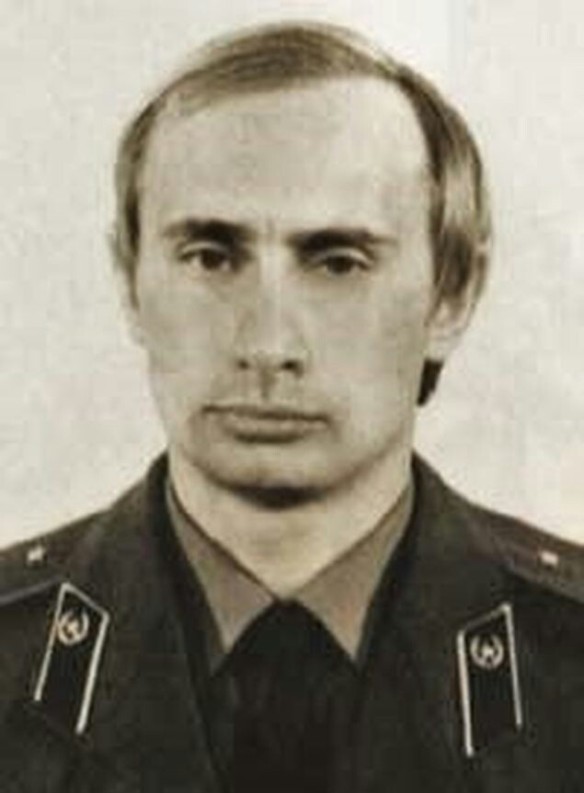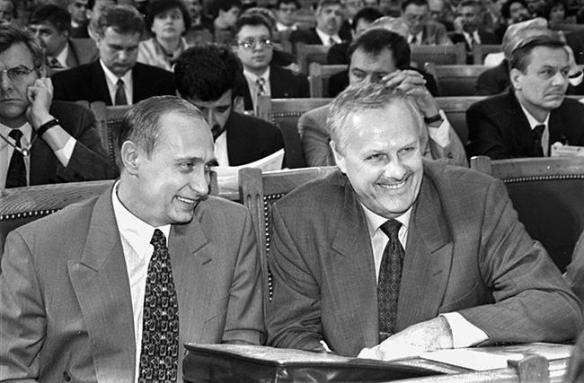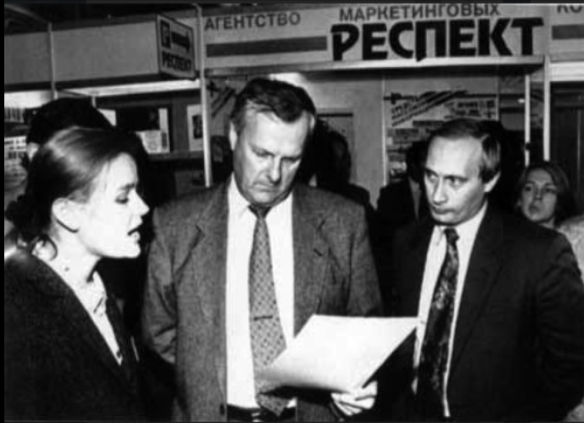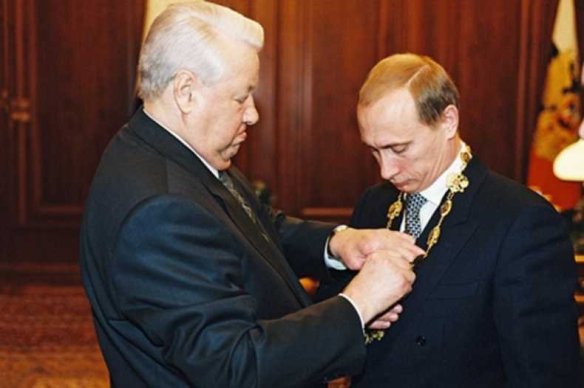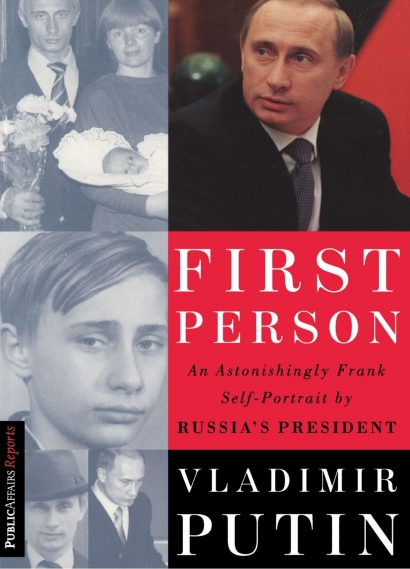Vladimir Vladimirovich Putin (above). First Person: An Astonishingly Frank Self-Portrait by Russia’s President (Public Affairs, 2000) recounts what can now be called Putin’s early years in the form of an oral history. Putin’s co-authors explained the book’s goal was to answer the complex question “Who is this Mr. Putin?” While it provides big pieces of the puzzle that is Putin in a historical context, one can also extrapolate from First Person much that would be useful in understanding Putin’s approach to the West and what guides his actions currently.
“He doth bestride the narrow world. Like a Colossus . . . .” These words from Act I Scene iii of William Shakespeare’s The Tragedy of Julius Caesar could certainly serve to describe a perspective that many in the West hold about Russian Federation President Vladimir Vladimirovich Putin. Indeed, there is a certain sense of wonder about him, his power, his will. Western observers ranginging from think tank analysts, learned scholars, journalists, leaders and officials in national capitals, former diplomats with firsthand experience with the Russian president along with self-styled experts with a comparatively paltry knowledge of him, have engaged in endless examinations of Putin. Many are actually more akin to ruthless vivisections. So popular is the exercise of analyzing Putin and proffering views of him that the mixed bag of his observers are fashionably referred to as “Putinologists.” Many would argue that harsh criticism of Putin for his actions at home and abroad is deservedly meted out. Some very likely declare Putin’s decisions and actions unnecessary or unacceptable, desiring to sail with the prevailing wind. Yet, one might also intuit that the most ferocious attacks on Putin, typically spoken or written at great distance from Moscow, signal an almost inexorable fear of him. Uncertainty can breed fear. Surely, many things about Putin are difficult to understand, and, consequently, are misunderstood.
In First Person: An Astonishingly Frank Self-Portrait by Russia’s President (Public Affairs, 2000), Putin, with the assistance of journalists Nataliya Gevorkyan, Natalya Timokova, and Andrei Kolesnikov, recounts what can now be called his early years. The book takes the form of an oral history instead a memoir or autobiography. It does not simply provide a history of events, organizing them more or less along a timeline. Putin’s co-authors explained the book’s goal was to answer the complex question “Who is this Mr. Putin?,” or at least bring the reader a little bit closer to understanding Russia’s “new president.” Putin was interviewed by his three co-authors on six separate occasions for approximately four hours at a time. They discussed his life. Whenever questions proved to be uncomfortable, too invasive, he would ask them to turn off the tape recorder. The co-authors also interview his family members and people who knew him well or played an important role in his destiny. The book includes only the interviewers’ questions and the responses of Putin and his relatives and colleagues. His co-authors recognized the book’s format was unusual. If questions caused either Putin or his relatives to reminisce or ponder, they were never interrupted. No editorial lines were added to the text. The interviews generally occurred late at night, around the dinner table. Once they were conducted at Putin’s office at the Kremlin. The co-authors met with Putin’s wife and with two daughters at his dacha. The 208 page book has nine “parts.” Those parts are organized as follows: The Son; The School Boy; The University Student; The Young Specialists; The Spy; The Democrat; The Bureaucrat; The Family Man; and, The Politician. Included in the book are several extraordinary personal photos of Putin and his immediate family. Photos of Putin taken closest to the time of publication show him before he had the eyes of the experienced, battle-scarred leader. His eyes appear similar to those of the very best students of a fine university, watching and peering, learning and discerning constantly in order to best prepare himself to lead Russia into the future.
First Person did not have to compete with other texts on Putin at the time of its publication. There was a fog of uncertainty that hampered the ability of observers to view power players in Russia beyond Russian Federation President Boris Yeltsin. Moreover, for a while after Yeltsin took power following the 1991 coup d’etat attempt against Soviet President Mikhail Gorbachev by the Gang of Eight and the subsequent Second Russian Revolution, the selection process for officials in the Yeltsin government was a bit higgledy-piggledy at that stage. Officials in top positions would come and go. Putin’s name was among those that emerged in the midst of everything. He garnered modest media attention internationally. While it increased once he became acting president, it reached nothing close to his current prominence and celebrity. First Person was largely viewed in the West as a campaign biography. It was first published in the Russian newspaper Kommersant as such. A New York Times review of First Person stated, “The new Russian leader, Vladimir Putin, who is 47, has been a bit of a mystery man. Outside of his former colleagues in the KGB and in St. Petersburg city government, few had heard of him.” Interestingly, a review of the book in Foreign Affairs stated, “He offers little hint of the direction in which he intends to lead probably because he does not know.” First Person may have garnered interest beyond Russia hands around the world, but it did not make any best seller lists. Other books providing a picture of Putin’s activities before and just after he became president have been published, but those texts only tell Putin’s story in the third person. First Person provides a “first person” account of those events. By delving deep into the book, greatcharlie found that it prefigured the world leader that Putin would become. Reading First Person, it might even seem to some that for cosmic, preternatural, or even divine reasons, Putin was prepared, expected, not put in place by coincidence. First Person is rarely mentioned in present-day commentaries about Putin. The book’s important information should not lay inert, unread. First Person provides big pieces of the puzzle that is Putin in a historical context. Yet, one can also extrapolate much from it that would be useful in understanding Putin’s actions and in interpreting what guides his current approach to relations with the West.
Who is the Russian Leader?
Before delving into details of this very unique and edifying book’s discussion, it is necessary to offer a bit more about the world renowned national leader who is its author. A succession of political positions were thrust upon Putin shortly after he left the Soviet Union’s Komitet Gosudarstvennoy Bezopasnosti (the Committee for State Security) known better as the KGB—the agency responsible for intelligence, counterintelligence, and internal security. Once on the right path, he broke all sorts of records on his way to the top. In 1997, he served as head of the Main Control Directorate. In 1998, he was named first deputy head of the Presidential Administration, responsible for the regions. In 1998, he was ordered to serve as director of the Federal’naya Sluzhba Bezopasnosti Rossiyskoy Federatsi (Russian Federation Federal Security Service) or FSB. Later that same year, he was named Secretary of the Security Council. In August 1999, he was made prime minister. It was Russian Federation President Boris Yeltsin’s unexpected resignation on New Year’s Eve 1999 that resulted in Putin’s elevation to the Kremlin. He then won the 2000 Russian Federation Presidential Election much to the surprise of Western experts. Putin did not inherit an ideal situation in Russia when he became president. While on his way to the top of the political heap, Putin saw how mesmerising “reforms” recommended to Yeltsin’s government by Western experts drastically impacted Russia’s economy in a way referred to somewhat euphemistically by those experts as “shock treatment.” Yeltsin was unaware that Western experts were essentially “experimenting” with approaches to Russia’s economic problems. His rationale for opening Russia up to the resulting painful consequences was not only to fix Russia’s problems but ostensibly to establish comity with the West. The deleterious effects of reform recommended by Western experts’ could be seen not only economically, but socially. In the West, alarming statistics were reported for example on the rise of alcoholism, drug addiction, birth defects, HIV/AIDS, a decreased birth rate, and citizens living below the poverty line. Glum faces on Russian officials who apparently sensed that the society, all of its institutions, was sliding downward, moving closer to the darker days of the Soviet era. Putin recognized that along with the trials created by the collapse of the Soviet Union and ensuing economic hardships Russia suffered, came a loss of prestige and the image of power. That loss was made worse by newsmedia reports from Russia’s second war in Chechnya which was brutal and at times seemed unwinnable. As Russia’s privation was publicized internationally, perceptions of Russia changed for the worst worldwide. However, Putin saw no need for Russia to lose its dignity as a result of its large step backward. Putin believed Russia would rise again, and that some acceptable substitute for the Soviet Union might be created. He never lacked faith about that. (In later years, Putin would not hesitate to inform leaders of countries that were once Soviet republics of his intention to bring them back under Moscow’s political, economic, and military influence.) Putin was loyal and obedient while he served Yeltsin, but saw him tarry too long as Russia strained in a state of collapse.
The English mathematician and philosopher Alfred North Whitehead stated “The art of progress is to preserve order amid change and to preserve change amid order. When Putin took power, the West expected him to give it nothing less than his unequivocal cooperation in a manner similar to his predecessor. Western capitals also expected Putin to be a bit wobbly taking on so much responsibility at a relatively early age. Yet, Putin knew his shoulders could bear the burden. He had no desire to be just a man of the moment in Russia. Much as Yeltsin, Putin, too, showed patience toward the West for a while, but he did not procrastinate. He took on the mission of breathing fresh breath into a country that was dying. He pushed ahead with plans “to save” Russia from disintegration and frustrate what he sensed were Western efforts to weaken it. Indeed, Putin did not believe congenial relations with the West were authentic given the many years of geopolitical struggle. Putin believed then, and believes now, that the greatest danger to Russia comes from the West. He believes Western governments are driven to create disorder in Russia and make it dependent of Western technologies. Still, Putin has shown that would prefer to outthink his rivals in the West rather than fight them. That notion has influenced his responses in contentious situations. It also accounts for the sustained peace with the US. In a September 11, 2013 New York Times op-ed, Putin took umbrage over the idea of “American exceptionalism.” Putin is unlikely thrilled by the slogan “Make America Great Again,” or the concept “America First.” surely, the West is not Putin’s only concern, but relations with it affects Russia’s prestige and ability to act globally.
Putin was proactive as he tried to get a real handle on things. His challenges of the West were timed, calculated risks. Still, despite being measured in his approaches, in a few cases, he did gamble a bit. Former US President Calvin Coolidge explained plainly: “Knowledge comes, but wisdom lingers. It may not be difficult to store up in the mind a vast quantity of facts within a comparatively short time, but the ability to form judgments, requires the severe discipline of hard work and tempering heat of experience and maturity. There is a chorus of Putinologist who have proclaimed Putin’s style of management was shaped by his career as an officer in the KGB. For some time, greatcharlie agreed with that assessment. The KGB certainly had an impact on him. He reached the rank of lieutenant colonel before retiring. Putin’s experience as a KGB officer was also valuable in planning policy approaches and doing things as effectively as they were done at the tactical level in the field. Yet, through a reread of First Person, greatcharlie recognized as Putin admitted in the book, that his seven years of experience working the local government of St. Petersburg was good learning experience for both administrative and managerial work. To the extent that his civilian work experience in St. Petersburg and KGB service coalesced, as president, Putin has sought the assistance of a small group of men who served alongside him in St. Petersburg during his KGB career. As chief executive, Putin proved skillful in the handling the day to day operations of the government. He managed to shape his environment by developing approaches for issues such as combating terrorism, combating and controlling organized crime, curbing foreign influences, improving public safety, improving public health, business reform, invigorating industries, controlling oligarchs. To use a soft metaphor, Putin tilled the soil so that he could plant his plans and programs for Russia’s future with certainty that they would grow. He had a hand in everything, and his touch was heavy. Putin’s decisions were always well-informed, not by reading reports handed to him, but through his own research on anything in which he had an interest, and in international affairs, through good use of streams of intelligence. However, Putin also made good use of his intuition to discern his opponents’ thinking, and has paid heed to his intimations about their courses of action. More often than not, he hits the mark. Putin sought to take on qualified ministers, directors, and other officials to handle specialties. That effort was hampered to an extent during Putin’s early years in power given the need to respond to the wishes of certain patrons. Still, Putin never hesitated to fire those foisted upon him or his handpicked hires, whether former KGB or not, when they failed to perform. Putin has known what advice, prognostication, and proposals to accept in order to promote his efforts at home and internationally and develop a coherent set of policies. Since he brings his “A-game” to his office everyday, striving for perfection and hungering for improvement, and he expects the same from his cabinet. There are never any spectators, passengers along for the ride. All must be able to answer the who, what, when, where, why, and how of issues they cover, because that is what Putin will ask for. At the present, Putin is probably working with the best cabinet he has ever crafted both in terms of the quality of their work and chemistry.
On domestic matters, Putin, when necessary, proved well-equipped to control, manipulate, and strong arm, seemingly endless groupings of aggressive political opponents. Indeed, early on as president, Putin effectively dealt with challenges posed by Vladimir Zhirinovsky of the extreme right Liberal Democratic Party of Russia, and Gennady Zyuganov of the Communist Party of Russia. The challenges posed by them lessened every year afterward. With the support of allies, Putin eventually changed Russia’s direction and, to a degree, transformed it. Russia got back into the big power game, and began to take active measures to protect what was viewed in Moscow as its interests. Currently, public opinion on Putin in Russia is extraordinarily high. Polling from the Levada Center in September 2016 put him at an 82 percent approval rating. Initial efforts made by Putin in 2000 to secure Russia and improve its well-being were appreciated by fewer Russians. The cause, in part, was a skepticism about the intentions of national leaders, believing there was an imbalance in their thinking impelling them to tilt toward corruption as opposed to serving the national interest, which was their charge under the constitution. Convinced of the corrupt nature of national leaders, perhaps they would go as far as to say such behavior was immutable, and would accept the Western label “kleptocracy” to describe Russia. Some might also agree that the baneful shroud of tyranny has covered the country since the Soviet era. Although Putin restored order from turmoil in Russia, many in the West and in Russia’s opposition movement would say he accomplished this with little regard for human and political rights. They would certainly point to the deaths of the statesman, politician, journalist, and opposition political leader, Boris Nemtsov; journalist Anna Politkovskaya; and, former KGB officer Alexander Litvinenko. Attention might also be directed to the deaths of 36 generals and admirals from 2001 to 2016. No clear effort has made to dilute such reports, but in the majority of cases, the causes of death listed were listed as suicides, heart attacks, or unknown. Among those who died are former Russian Federation National Security Adviser and Army Major General Vladimir Lebed and the Head of the Main Intelligence Directorate of the General Staff of the Armed Forces of the Russian Federation Russian Federation Army Colonel-General Igor Sergun. Yet, no matter what Putin may be doing domestically or internationally, in his mind, he is always honest to himself and justified as he performing the duty entrusted to him. On June 10, 2015, Putin was asked by the editor in chief of the Italian daily Corriere della Sera, “Is there any action that you most regret in your life, something that you consider a mistake and wouldn’t want to repeat ever again.” Putin stated, “I’ll be totally frank with you. I cannot recollect anything of the kind. It appears that the Lord built my life in a way that I have nothing to regret.”
Patriotism permeates everything Putin does. It is hard to imagine how he would think any other way, given ideas on sacrifice for the motherland that Putin acquired from his parents, grandparents, and other family members. Yet, much of what he learned of his family’s valor was caught by him, not taught. He said: “when relatives would come to visit them in St. Petersburg, there would be long chats around the table, and I would catch some snatches, so many fragments of the conversation.” Putin’s grandfather was a cook for Josef Stalin and his father served gallantly in a battalion of the Narodnyi Komissariat Vnutrennikh Del (Peoples Commissariat of Internal Affairs) or NKVD during World War II.
A Taste of What Lies within First Person
First Person does not simply provide a history of events, organizing them more or less on a timeline. What is most intriguing and very unique about First Person is what each chapter reveals about Putin’s thinking; what is in his mind. One is also provided with a cultural context in which to examine how Putin moved, lived during the years covered.
Putin: In the Beginning
In reading Part 1, one can begin to understand why patriotism permeates everything Putin does. However, given ideas on sacrifice for Mother Russia that Putin acquired from his parents, grandparents, and other relatives, it is hard to imagine how he would think any other way. According to Putin, much of what he learned about his family’s valor was caught by him and not taught directly to him. Indeed, he explains: “My parents didn’t talk much about the past, either. People generally didn’t, back then. But when relatives would come to visit them in St. Petersburg, there would be long chats around the table, and I would catch some snatches, so many fragments of the conversation.” Putin’s grandfather, whose name was Spiridon Ivanovich Putin, was a cook. However, after World War I he was offered a job in The Hills district on the outskirts of Moscow, where Vladimir Lenin and the whole Ulynov family lived. When Lenin died, his grandfather was transferred to one of Josef Stalin’s dachas. He worked there for a long period. It is assumed by many that due to his close proximity to Stalin, he was a member of the infamous state security apparatus, the Narodnyi Komissariat Vnutrennikh Del (Peoples Commissariat of Internal Affairs) or NKVD. Putin notes his grandfather who came through the purges unscathed although few people who spent much time around Stalin did so. Putin also notes that his grandfather outlived Stalin, and in his later, retirement years, he was a cook at the Moscow City Party Committee Sanatorium in Ilinskoye. As for Putin’s mother, Mariya Ivanovna Putina, née Shelomova, during the war, she refused to leave St. Petersburg (then called Leningrad) as the Germans were blockading it, but was eventually taken out to Smolny by her brother when it became impossible for her to remain. Under gunfire and bombs, he extracted her and her baby, Albert, Putin’s brother, out. She put the baby in a shelter for children, which is where he came down with diphtheria and died. (Note that in the 1930s, Putin’s mother lost another son, Viktor, a few months after birth. Putin’s mother nearly died from starvation. In fact, when she fainted from hunger, people thought she had died, and laid her out with the corpses. With God’s grace, she awoke and began moaning. She managed to live through the entire blockade of Leningrad. It was nearly a decade later, on October 7, 1952 that she gave birth to the Russian Federation President. (Note that the two names for Putin’s hometown, St. Petersburg and Leningrad, were used interchangeably by Putin during his interviews.)
It was also noted by Putin in Part 1 that his mother attended church and had him baptised when he was born. She kept his baptism a secret from his father, who was a party member and secretary of a party organization in his factory shop. Putin relates a story concerning her faith as well as his own in Part 1’s final paragraph. He explains: “In 1993, when I worked on the Leningrad City Council, I went to Israel as part of an official delegation. Mama gave me my baptismal cross to get it blessed at the Lord’s Tomb. I did as she said and then put the cross around my neck. I have never taken it off since.”
Putin’s mother, Mariya Ivanovna Putina, née Shelomova (above). Putin’s mother attended church and had him baptised when he was born. She kept it a secret from his father, who was a party member and secretary of a party organization in his factory shop. During World War II, her baby son came down with diphtheria and died, and she nearly died as well from starvation. She managed to live through the entire German blockade of Leningrad.
As for Putin’s father, Vladimir Spiridonovich Putin, he was on the battlefield, serving in a NKVD demolitions battalion, engaged in sabotage behind the German lines. There were 28 members in his group. Recounting a couple of experiences during the war that his father shared with him, Putin explains that on one occasion after being dropped into Kingisepp, engaging in reconnaissance, and blowing up a munitions depot, the unit was surrounded by Germans. According to Putin, a small group that included his father, managed to break out. The Germans pursued the fighters and more men were lost. The remaining men decided to split up. When the Germans neared Putin’s father, he jumped into a swamp over his head and breathed through a hollow reed until the dogs had passed by. Only 4 of the 28 men in his NKVD unit returned home. Upon his return, Putin’s father was ordered right back into combat. He was sent to the Neva Nickel. Putin says the small, circular area can be seen, “If you stand with your back to Lake Ladroga, it’s on the left bank of the Neva River.” In his account of the fight, Putin explains German forces had seized everything except for this small plot of land, and Russian forces had managed to hold on to that plot of land during the long blockade. He suggests the Russians believed it would play a role in the final breakthrough. As the Germans kept trying to capture it, a fantastic number of bombs were dropped on nearly every part of Neva Nickel, resulting in a “monstrous massacre.” That considered, Putin explains that the Neva Nickel played an important role in the end. Dire necessitas. (Dire necessity.)
Putin was asked by an interviewer if he thought “we paid too high a price for that little piece of land?” Putin replied: “I think that there are always a lot of mistakes made in war. That’s inevitable. But when you are fighting, if you keep thinking that everybody around you is always making mistakes, you’ll never win. You have to take a pragmatic attitude. And you ave to keep thinking of victory. And they were thinking of victory then.” Victoria natura est insulens et superba. (Victory is by nature superb and insulting.)
Putin’s father, Vladimir Spiridonovich Putin (above). Putin’s father engaged in sabotage behind the German lines in World War II. In First Person, Putin recounts a couple of stories about his father’s experiences during the war. Putin tells that on one occasion after being dropped into Kingisepp, engaging in reconnaissance, and blowing up a munitions depot, his father’s unit was surrounded by Germans. Less than 15 percent of its men returned to Russian lines. His father also fought at the Neva Nickel, described most often as a “monstrous massacre.”
Putin and the Martial Arts
Parva scintilla saepe magnam flamam excitat. (The sparkle often initiates a large flame.) In Part 2, readers learn from Putin he was not the best student in elementary school. By fifth grade he was known for acting out, preferring to spend more time playing in a courtyard behind his home than anything else. In his own words: “I was a hooligan.” “I really was a bad boy.” However, his teacher in elementary school, Vera Dimitrieva Gurevich, saw great promise in him. While he was receiving C grades, he could do much better. Indeed, she looked upon him as a classic underachiever who needed encouragement and a goal to focus on. He had to discover the connection between effort and achievement. Recounting a conversation with Putin’s father, she recalls saying to his father: “You have to have a talk with him. Let’s work on him together, you at home and I at school. He could be getting better than C’s. He catches everything on the fly.” Interestingly, Putin’s focus and performance in school improved and his bad behavior was more or less extinguished once he was introduced to the martial arts. Putin notes that he became involved with sports when I was 10 or 11, “As soon as it became clear that my pugnacious nature was not going to keep me king of the courtyard or school grounds.” He first tried boxing, but in his words “didn’t last long there,” quickly getting his nose broken. After losing his “boxing bug,” he tried samba, a Soviet combination of judo and wrestling. He attended a class near his home. It was a very plain gym owned by the Trud athletic club. His trainer was Anatoly Semyonovich Rakhlin, a man who devoted his whole life to his art. Putin said Semyonovich played a decisive role in Putin’s life, believing that if he had not become involved in sports, he cannot say for certain how his life would have turned out. At first Putin studied samba, then he moved to judo. Semyonovich had decided all the students would study it. Putin’s description of judo in the book manifests his love for the art. He explains: “Judo is not just a sport, you know. It’s a philosophy. It’s respect for your elders and for your opponent. It’s not for weaklings. Everything in judo has an instructive aspect. You come out onto the mat, you bow to one another, you follow ritual. It could be done differently, you know. Instead of bowing to your opponent, you could jab him in the forehead.”
Putin’s focus and performance in school improved and his bad behavior was more or less extinguished once he was introduced to the martial arts, more specifically, judo. Putin notes that he became involved with sports when he was 10 or 11. His trainer was Anatoly Semyonovich Rakhlin, a man who devoted his whole life to his art. Putin said Semyonovich played a decisive role in his life, believing that if he had not become involved in sports, he could not say for certain how his life would have turned out.
Putin’s involvement in the martial arts had a direct impact on his lifestyle. While admitting that prior to studying judo he tried smoking a couple of times, but “ruled it out” when once he became engaged in sports. Putin says initially worked out every other day, then every day. He says he soon had no time available for anything else. Regarding his thinking at the time, he explains: “I had other priorities; I had to prove myself in sports, achieve something for. I set goals. Sports really had a strong influence on me.” Qui studet optatam cursu contingere metam multa tulit fecitque puer, sudavit et alsit abstinuit Venere et Baccho. (He who wants to achieve his desired career goals, as a child must endure and do a lot of things, sweat a lot, and experience harsh cold, and refrain from Venus [goddess of love] and Bacchus [god of wine].)
However, his time training in the martial arts also allowed him to learn lessons about life and about people. In recounting one episode during his training that left a lasting impression on him, Putin explains: “Once we went to the gym with Leonid Ionovich, the senior coach from Trud. The karate kids were working out on the mat, although it was our turn. Leonid went up to their trainer and told him it was time for our class. The karate trainer didn’t even look his way–as if to say, get lost. Then Leonid, without saying a word, flipped him, squeezed him lightly, and dragged him off the mat. He had lost consciousness. Then Leonid turned to us and said “Go on in and take your places.” Putin said it was a manifestation of an attitude toward karate, but he could not help but learn from that one must have the will and the power to protect one’s interest, to take what is rightfully yours. The judo team was scheduled to use the mat and the coach made certain they did so. Periclum ex aliis facito tibi quod ex usu siet. (Draw from others the lesson that may profit yourself.)
Putin’s KGB Dream
in Part 2, Putin reveals that at an early age, he wanted to serve in intelligence. The genesis of the idea was books and spy movies such as Sword and the Shield. His prior interest as a youth was to become a pilot. That interest was similarly stirred through the reading of literature and a subscription to an aviation journal. In achieve that goal, for a while he was focused on attending the Academy of Civil Aviation. Before he wanted to become a pilot, Putin desired to be a sailor. However, his ultimate desire to serve in intelligence was a bit different. Putin explained: “What amazed me most of all was how one man’s effort could achieve what whole armies could not. One spy could decide the fate of thousands of people. At least, that’s the way I understood it.” His family was dismayed, but not shattered by his decision. His father, given his experience, was aware of the grave nature of work in that field. Once his parents became fully cognizant of the extreme nature of his apnew ambition, they sought to discourage him from going down that path as best the could. When Putin’s martial arts coach, Semyonovich, came to their home to tell them that as an athlete, he could get into an Institute practically without passing exams, they pushed the coach to encourage him to take that path. He agreed to try. However, he found Putin resistant to the idea. He could not fathom why. Another coach from the Trud Club, Leonid Ionovich, came to visit. He was aware of Putin’s ambitions concerning intelligence work and was ready the set him straight. As Putin explained it, “He was a clever guy.” Recounting an exchange with Ionovich over his career choice, Putin said the following: “‘Well,’ he [Ionovich] said to me, ‘Where are you going?’ Of course he already knew. He was just acting sly. I said, ‘To university.’ ‘Oh, that’s great, good for you,’ he said, ‘in what department?'” Putin replied, “The law school.” Then coach Ionovich roared: “What? To catch people? What are you doing? You’ll be a cop. Do you understand?” Insulted, Putin yelled back, “I’m not going to be a cop” The use of his intellect to make a determination on his future, the will to push ahead on that track, his tenacity, would become the hallmarks of Putin’s approach to matters and how he would succesfully achieve objectives. Putin took “active measures” in the effort to reach his goal of joining the intelligence service. Remarkably, around the beginning of the ninth grade, Putin went into the office of the KGB Directorate to investigate the possibility of working there. He explains that employee came out to hear what he had to say. Putin says he told him, “I want to get a job with you.” The employee said: “That’s terrific, but there are several issues. First, we don’t take people who come to us on their own initiative. Second, you can come to us only after the Army or after some type of civilian higher education.” Putin inquired, “What kind of higher education?” “Any!” he said. Putin says he presumed “the man probably wanted to get rid of me,” but he nevertheless inquired further “But what kind is preferred?” The man responded “Law school.” For Putin, “that was that.” He explained: “From that moment on, I began to prepare for the law faculty of Leningrad University. And nobody could stop me.”
File photo of Putin as a young KGB officer (above). Putin reveals that at an early age, he wanted to serve in intelligence. The genesis of the idea were books and spy movies. Putin explained: “What amazed me most of all was how one man’s effort could achieve what whole armies could not. One spy could decide the fate of thousands of people.” His mother and father, with the help of his coaches tried to dissuade him from his career choice to no avail. In ninth grade, Putin visited the KGB Directorate’s office to investigate the possibility of working there. A few years later, his dream surprisingly became a reality.
Putin’s KGB Recruitment
Grata superveniet, quae non sperabitur hora. (Welcome will arrive at the hour that was not hoped for.) In Part 4, Putin outlines his recruitment into the KGB and the initial activities in which he was engaged for the service. Putin admits that during all his years in university, he actually waited for the man at the KGB office to contact him. Alackaday, he began to give up hope. As Putin says he reasoned at the time: “It seemed that he had forgotten about me. After all, I had gone to see him as a school kid. Who would have thought that I could have such spunk? But I recalled that they didn’t like people to show their own initiative, so I didn’t make myself known. I kept quiet. Four years passed. Nothing happened. I decided that the case was closed, and I began to work out different options for finding employment either in the special prosecutor’s office or as an attorney. Both are prestigious fields.” However, when he was in his fourth year of university, a man came and asked Putin to meet with him. Putin said the man did not say who he was, but he immediately figured it out, because he said “I need to talk to you about your career assignment. I wouldn’t like to specify what it is yet.” Putin said he reasoned at the time: “If they didn’t want to say where, that meant it was there.” Putin’s story about his recruitment goes on: “We agreed to meet right in the faculty vestibule. He was late. I waited for about 20 minutes. Well, I thought, what a swine! Or someone was playing a prank on me? And I decided to leave. Then suddenly he ran up, all out of breath. “I’m sorry,” he said. Putin notes that he liked that. Then Putin heard what must had been magical words: “It’s all arranged.” He went on to state: “Volodya [Close friends used the diminutives Volodya or Vovka instead of Vladimir when speaking to Putin], there is still a lot of time, but how would you feel if you were invited to work in the agencies?” Putin interestingly remarked: “I didn’t tell him that I had dreamed of this moment since I was a schoolboy. I didn’t tell him, because I remembered my conversation in the KGB office long ago: ‘We don’t take people who come in on their own initiative.’” Despite what was said that day in the vestibule, Putin heard nothing more. The man disappeared. Then, there was the odd day when Putin received a phone call; an invitation to the university’s personnel department. However, when Putin arrived at the employment commission there was some confusion. Putin explains that when reached his name, a representative from the department of law said, “Yes, we’re taking him into the bar.” Then an agent sitting in a corner of the room who was monitoring the students’ assignments suddenly awoke and said, “Oh, no.” He went on to say: “That question has already been decided. We’re hiring Putin to work in the agencies of the KGB.” Putin claims the agent said it out loud in front of the jobs assignment commission. Nevertheless, days later Putin was completing several application forms and papers. Ad posse, ad esse. (From possibility to reality.)
At first the KGB assigned Putin to the Secretariat of the Directorate, and then to the counterintelligence division, where he worked for about five months. When asked by the interviewers if work in the KGB was what he imagined it would be or what he was expecting, Putin said: “No, of course it wasn’t what I had imagined. I had just come from university, after all. And suddenly I was surrounded by old men who had been in their jobs during those unforgettable times. Some of them were just about to go into retirement.” For Putin, as with most of his young colleagues, the KGB offered a solid basis for believing that the Soviet system could be protected and sustained. The KGB, as a central organ of the government, ostensibly had the know-how and the resources to prevent the Soviet Union, and the contiguous countries of the Eastern bloc that it led, from falling into a chaotic condition. As a novice in the KGB, Putin’s intent was to be honest in his own convictions within the parameters of his mission. However, actual work with longtime agents put his beliefs to the test. Putin mentions one occasion of that. He explains: “One time a group was drafting a scenario. I was invited to join the meeting. I don’t remember the details, but one of the veteran agents said that the plan should be followed in such-and such a way. And I piped up: “No, that’s not right.” “What do you mean?” he said, turning to me. “It’s against the law,” I said. He was taken aback. “What law?” I cited the law, “But we have instructions,” he said. Once again I cited the law. The men in the room didn’t seem to understand what I was talking about. Without a trace of irony, the old fellow said, “For us, instructions are the main law.” And that was that. That’s how they were raised and that’s how they worked. But I simply couldn’t do things that way and it wasn’t just me. Practically all my peers felt the same way.” Ab honesto virum bonum nihil deterret. (Nothing deters a good man from the performance of his duties.)
Putin in the German Democratic Republic (above). When asked by the interviewers if work in the KGB was what he imagined it would be or what he was expecting, Putin said: “No, of course it wasn’t what I had imagined. I had just come from university, after all. And suddenly I was surrounded by old men who had been in their jobs during those unforgettable times. Some of them were just about to go into retirement.” As a novice at the KGB, Putin’s intent was to be honest in his own convictions within the parameters of his mission. However, actual work with longtime agents put his beliefs to the test.
As for the remaining stages of Putin’s training, he explains in Part 4 that for several months, he “went through the formalities and knocked off some cases.” He was sent to agent training for six months. Putin noted that the school in Leningrad was not too exceptional. Once his superiors believed he had mastered the basics, Putin was sent to Moscow for field preparation. After completing his studies in Moscow, Putin returned to Leningrad and worked about six months in the counterintelligence division. In Part 5, Putin expounds on the type of work in which he was engaged for the greater part of his KGB career. He said that during his counterintelligence training, officers from foreign intelligence began to notice him. He recounts: “They wanted to talk. First one conversation, then another, then a third and a fourth . . . Intelligence is always looking for more people for themselves, including people from the security agencies. They took people who were young and had certain appropriate qualities.” Putin was very pleased by their actions because he, just as everyone else, desired to work in foreign intelligence. It meant travel abroad under the conditions of the Soviet Union, and espionage was considered the white collar job in the agencies. Putin admitted that there were many people who exploited their positions in order to trade in foreign goods. It was an unfortunate fact. Without hesitation, Putin agreed to go into intelligence. He was sent for special training in Moscow for one year. He then returned to Leningrad and worked in the “first department.” The first chief directorate is intelligence. It had subdivisions in all the large cities of the Soviet Union, including Leningrad. He worked there for approximately four and a half years, and then went to Moscow for training at the Andropov Red Banner Institute, which is now called the Academy of Foreign Intelligence.
Putin recognized from the start at the Red Banner that he was being prepared for Germany. It became especially clear once faculty began pushing him to study German. He said it was just a question of where: the German Democratic Republic (GDR) or the Federal Republic of Germany (FRG). Putin explained that there were prerequisites for working in the FRG. An agent had to work in the appropriate department of the central office of the KGB. He had to languish there for one to three years. It was based on the individual. If an agent wanted to go to the GDR, he could go immediately. Putin chose the later. What might be of special interest of readers would be Putin’s description of his work in the GDR, particularly as it relates to NATO and political figures and political activities in the West. Putin said, “The work was political intelligence,” obtaining information about political figures and the plans of the main opponent: NATO. Interestingly, Putin says he never travelled to the FRG to perform his tasks. In a more precise statement of his intelligence activities he intriguingly described them as follows: “The usual intelligence activities: recruiting sources of information, obtaining information, analyzing it, and sending it to Moscow. I looked for information about political parties, the tendencies inside those parties, their leaders. I examined today’s leaders and the possible leaders of tomorrow and the promotion of people to certain posts in the parties and the government. It was important to know who was doing what and how, what was going on in the foreign Ministry of a particular country, how they were constructing their policy on certain issues and in various areas of the world, and how our partners would react to disarmament talks. Of course, in order to obtain such information, you need sources. So recruitment of sources, procurement of information, and assessment and analysis were big parts of the job. It was very routine work.” Putin makes it all sound so routine, while in the West today, revelations about such intelligence activities by Russia tend to overwhelm those who are just learning about it all.
Putin described his work in the GDR as political intelligence: obtaining information about political figures and the plans of NATO. He sought information on political parties, tendencies within them, and their leaders. He examined: today’s leaders and the possible leaders of tomorrow; the promotion of people to certain posts, who was doing what and how, what was going on in a country’s Foreign Ministry; how it was constructing policy on key issues and regions globally; and, likely reactions of partners to the disarmament talks.
Putin’s Political Mentor: Anatoly Sobchak
Quidquid ages, prudenter agas et respice finem! (Whatever you do, do cautiously, and look to the end!) In Part 6, Putin reviews the intriguing course of events that led him to leave his beloved KGB and work in the local government of St. Petersburg. Putin had become somewhat disturbed by his fellow countrymen’s insouciance toward the decay of both order and humanism in the Soviet State when returned home from the GDR. He was offered a job in the central office in Moscow, but he turned it down. Putin explained to the interviewers: “I knew that there was no future to the system. The country didn’t have a future. And it would have been very difficult to sit inside the system and wait for it all to collapse around me.” At that time, the work, in which Putin and his colleagues were engaged, did appear no longer necessary given how he described it. Putin remarked: “What was the point of writing, recruiting, and procuring information? Nobody at Moscow Center was reading our reports. Didn’t we warn them about what was coming? Didn’t we provide them with recommendations on how to act? There was no reaction. Who wants to work for nothing? To spend years of your life–What for–just to get paid?” Putin went on further with examples: “Let’s say, for example, that my friends in the scientific and technical intelligence paid several million dollars for some information about an important scientific discovery. It would have cost our country billions of dollars to independently develop the same project. My friends could procure the information and send it to the Center. People there would look at it and say ‘Wonderful. Great information. Thanks. Kisses. We’ll recommend you guys for medals.’ But then they would not use the intelligence. They wouldn’t even try, because the technical level of our industry simply didn’t allow for it.” Putin admits that when he returned from the GDR in January 1990, he continued to work in the agencies, but he quietly considered a backup plan. In the forefront of his thinking was his two children, and his need to support them. After a few interesting turns, his fortune improved a bit after he was asked to go “undercover” at Leningrad State University (LGU). It was an assignment Putin was happy to take, as it would allow him to write his doctoral dissertation in international law, become familiar with LGU, and perhaps help him get a position there. In following, in 1990, he became the assistant for international liaison to Stanislav Petrovich Merkuriev, the president of LGU, and someone Putin described as a good man and brilliant academic. Putin was able to reestablish contact with many old friends from the law faculty. Several of them had stayed on there, defended their dissertations, and became instructors and professors. One of them asked him to help Anatoly Aleksandrovich Sobchak, the chair of the Leningrad City Council. Putin explained his thinking on the matter: “Sobchak needed someone good on his team. Apparently, he was surrounded by crooks. Would I go and work for him? “You know, I have to think about it,” I said. “I’m a KGB personnel officer, after all. And he doesn’t know that. I could compromise.” As for his KGB status, Putin was placed in the active reserves. He explains elsewhere in the book that it was in the reserves that he reached the rank of full colonel. “Just talk to him,” his university friend reportedly said. Sobchak was already a famous and popular person that Putin admitted to observing what he did and said with great interest. He confessed that he did not like everything he saw, but Sobchak had gained his respect. Putin revealed that when Sobchak was a teacher at LGU, he had social connections to him. Putin said people had written that he was practically Sobchak’s favorite student. He dismisses that, saying he was just one of Sobchak’s lecturers for one or two semesters.
When Putin met Sobchak at his office in the Leningrad City Council, he explained the cause for his visit. Putin tells: “He was an impressive man, and said to me right off: ‘I’ll speak to Stanislav Petrovich Merkuriev. Come to work starting Monday. That’s it. We’ll make the agreement right now, and you’ll be transferred.” Putin told him that he would be would be happy to do that, but explained that he was not just an assistant to the president, and that he was also a staff officer of the KGB. Putin recalls, “He thought and thought, and then suddenly he said, ‘Well, screw it.’” Sobchak told Putin, “I need an assistant. Frankly, I’m afraid of going into the reception area. I don’t know who those people are.” Putin fully understood. Putin confirmed what he said his university friend had initially told him: “The people in Sobchak outer office–his cohorts–were harsh and rude in the best traditions of the Komsomol, the Soviet school. This disturbed the city council deputies and led to a conflict between Sobchak and the city council.” Putin then told Sobchak that he would be happy to come to work for him, but that I would first need to inform his managers at the KGB and resign from my post at LGU. Putin recognizes this as a delicate moment for it would be difficult to tell his managers of his intent to change jobs. As Putin recounts it: “I went to my boss and said, ‘Anatoly Aleksandrovich is proposing that I leave the university and go to work for him. If it’s impossible, I am ready to resign.’ They replied: ‘No. Why? Go and work there. There is no question about it.’” That surprised Putin. He surmised that his managers, “who were fairly subtle people and understood the situation,” did not impose any conditions on him. He remained formally listed in the security agencies, although he hardly set foot in the directorate building.
Putin (left) had become somewhat disturbed by his fellow countrymen’s insouciance toward the decay of both order and humanism in the Soviet State when returned home from the GDR. He was offered a job in the central office in Moscow, but I turned it down. Putin’s acceptance of an “undercover” assignment at Leningrad State University led to his entry into Russia’s political milieu via Anatoly Aleksandrovich Sobchak (right), the chair of the Leningrad City Council, and to his resignation from the KGB due to political pressures.
Recta conscientia traversum unguem non oportet discedere. (It is not advisable to move away from your conscience even the width of a fingernail.) Putin was also intrigued by the fact his managers never once tried to use him for operations. He says he thought they understood it would have been pointless. However, on one occasion my colleagues from the agencies tried to exploit Putin’s proximity to Sobchak. According to Putin, Sobchak would go on business trips and was frequently out of town. He would leave Putin in charge of the office. One day, he was in a big rush before a trip, and his signature was needed on a document that was incomplete. Sobchak could not wait for it. Sobchak then took three clean sheets of paper, put his signature at the bottom, and gave them to me, saying ‘Finish it up’ and left. That same evening, Putin recalls, his colleagues from the KGB came to see him. Putin explains: “We spoke about this and that, and then they mentioned how great it would be to have Sobchak’s signature on a certain document. Couldn’t we discuss it? But I was a seasoned person–I had survived so many years without a slip-up–and I sized up the situation right away. I took out the folder and showed them the blank sheets of paper with Sobchak signature. And they and I understood that this was testimony to the great degree of trust Sobchak had in me. ‘Can’t you see that this man trusts me?’ They immediately backed off. ‘No more questions,’ they said. ‘Sorry.’ And everything was nipped in the bud.” Putin noted that the situation was abnormal, and amusingly explained the salary he continued receiving from the KGB was greater than what he was receiving from the city council.
However, circumstances arose that forced Putin to consider writing a letter of resignation. Eventhough his experience with Russian politicians was brief, he learned fast. He understood that relations with the deputies in the city council would often turn down a bumpy road when they were lobbying were someone’s interests. Putin says he eventually had the following experience: “Once a deputy came up to me and said, ‘You know, we have to help so-and so. Could you do such and such?’ I had already put them off several times. One day he said to me, ‘There are bad people here–all sorts of enemies–and they’re sniffed out that you’re a KGB agent. You have to foil them. I’m prepared to help you, but you have to do me a favor.’” Putin realized that they would not leave him alone. To avoid what could have become endless attempts at manipulation, he made the difficult decision to write his letter of resignation. He was just sick and tired of that brazen blackmail. Difficile est longum subito deponere amorem. (It is difficult to suddenly give up a long love.)
In Part 6, Putin also goes into great detail about his work in the 1992 and 1996 mayoral elections in St. Petersburg and a sense is provided of his acumen and instinct for work in the political sphere. In 1992, he played a definitive role in Sobchak’s election as the first popularly elected mayor of the city. As chair of the Leningrad City Council under the old system, Sobchak could have been removed by the council members at any moment. He needed a more stable position. Sobchak finally agreed that the post of mayor had to be introduced. However, Putin explains that because he had fair conflictual relations with the majority of deputies on the council, it was not certain that the proposition would pass. Meanwhile, his public popularity was very high. Putin told the interviewers that the deputies knew that Sobchak would be elected mayor if they voted to introduce the post, and they did not want that. They liked the fact that they could always keep Sobchak on a hook. Putin says that he was directly involved in active measures to convince some of the deputies that it would be best for the city if it had a mayoral post. Putin says he also managed to mobilize the heads of the city districts. He notes that they did not have the right to vote, but they could influence their deputies. In the end, the objective was achieved through hard work. The decision to introduce the post of mayor was passed by the Leningrad City Council, by a margin of a single vote. Putin was also able to assess four years later after taking inventory of the his team’s capabilities and possibilities for success that in order to win re-election, Sobchak would need “professional campaign managers and technicians–not just a guy who could finesse the deputies.” Putin saw that it was a whole new ball game. Campaign plans had to be adjusted to fit circumstances.
Russian Local Politics 101
Et monere et moneri proprium est verae amicitae. (It is a characteristic of true friendship to give advice and to receive it.) Putin said that he told Sobchak right off, “You know, you’re on a completely different playing field now. You need specialists.” He agreed, but then he decided that he would conduct his own electoral campaign. When interviewers asked Putin if overconfidence guided Sobchak’s decision, Putin said money could have been a factor. He says: “You know, running a campaign, bringing in specialists–all of this costs money. And we didn’t have any. Sobchak had been under investigation for a year and a half on allegations that he had bought an apartment with city funds. But in fact, he did not have any money either for an apartment or for an election campaign. We were not extracting funds from the city budget. It never entered our heads to find the money we needed that way.” However, with regard to Sobchak’s opponent, Vladimir Anatolyevich Yakovlev, the former governor of Leningrad oblast (province), Putin said that he got the funds he needed at Moscow’s expense. He believed Yakovlev was supported by the very same people who orchestrated the ethics campaign against Sobchak. Putin said at the time that Aleksandrovich Vasilyevich Korzhakov, who had been removed as head of the Presidential Security Service in 1996, played an active role against Sobchak. That was in accord with the information that Sobchak’s campaign had, and with information revealed by Oleg Nikolayevich Soskovets, a member of Yeltsin’s 1996 Presidential Campaign. Putin said: “The law enforcement agencies were brought in later. They play very dirty.” Putin outlines one of techniques used against Sobchak: “About a year and a half before elections, a commission came to St. Petersburg from Moscow. The commission had been appointed by the heads of three agencies: the FSB, the Interior Ministry, and the prosecutor’s office. They opened up real criminal cases and made Sobchak a witness in two of them. During the election campaign, someone sent an inquiry to the Prosecutor General’s office, asking whether Sobchak was involved in any criminal investigations. The very same day, the answer came back: Yes, there were two criminal cases under investigation. Naturally, they didn’t explain that he was a witness, not a suspect, in these cases. The reply from the Prosecutor General’s office was duplicated, and flyers were dropped over the city from a helicopter. The law enforcement agencies were interfering directly in a political contest.”
Putin goes into great detail about his work in the 1992 and 1996 mayoral elections in St. Petersburg. One gets a sense of his acumen and instinct for work in the political sphere. In 1992, he played a definitive role in Sobchak’s election as the first popularly elected mayor of the city. In 1996, Putin assessed that in order to win re-election, Sobchak would need professional campaign managers and technicians. He recognized it was a “whole new ballgame.” However, Sobchak decided to run his own campaign office. There were many missteps, and he lost the election.
Nihil æ grius quam disciplinam accipimus. (We receive nothing with so much reluctance as instruction.) After Sobchak decided to run his own campaign office, Putin says Sobchak’s wife, Lyudmila Borisovna, got involved. Sobchak pronounced her campaign manager. Putin said the campaign team tried to talk both of them out of this, because they were not convinced that everyone in the campaign office would be willing to take orders from her. A lot of time was lost debating who should run the campaign. Another Sobchak deputy, Aleksei [Alexei] Kudrin, got involved. Sobchak asked Putin to continue to work in city affairs, leaving him to manage the economic activity of a city with a population of five million citizens during that period. At the last minute, between the first and second rounds, Kudrin and I tried to jump into the election fray, but it was hopeless. Putin says: “We really blew it on the election.”
For some time after Sobchak’s defeat in the mayoral elections, Putin says he stayed in his office in Smolny. The second round of presidential elections was underway, and he was working for the St. Petersburg headquarters of Yeltsin’s campaign. The newly elected mayor of St. Petersburg, Yakovlev did not move Putin out of his office right away; but as soon as the presidential elections were over, he was asked rather harshly to free up the space. By that time, Putin had already turned down Yakolev offer to keep my post as deputy mayor. Putin said he made the offer through his people. Putin explained: “I thought it would be impossible to work with him, and I conveyed that to him. Besides, during the campaign, I was the one who had initiated a statement signed by all the officials in the mayor’s office that we would all leave Smolny if Sobchak lost. It was important to express our solidarity, so that all the people who worked with Anatoly Aleksandrovich and his administration would realize that his defeat would be a defeat for them, too. It was a good stimulus to get the all involved in the struggle.” Moreover, Putin recalls: “We called a press conference and made a public statement, which I read. So, it was impossible for me to remain behind in the mayor’s office after Sobchak lost.” However, Putin said what really made staying on with Yakovlev a bad idea was his attacks on him during the campaign. Putin said: “I don’t remember the context now, but in a television interview, I had called him Judas. The word seemed to fit, and I used it.” Western newsmedia headlines currently point to Putin’s alleged efforts to influence elections in their countries, including the US. However, Putin leaves no doubt that he was disgusted with Yakovlev due to his role in the grand effort to influence the election against Sobchak. It was a sound educational experience that Putin would never forget. In amicitia nihil fictum est, nihil quisquid est, id est verum et voluntarium. (In friendship there is nothing fictitious, nothing simulated, and it is in fact true and voluntary.)
After serving in the city government of St. Petersburg, and coping with a period of unemployment, Putin dashed to the top. He served as head of the Main Control Directorate in 1997. He was named first deputy head of the Presidential Administration, responsible for the regions. He served as director of the Russian Federation Federal Security Service and then was named Secretary of the Security Council in 1998. In August 1999, he was made prime minister. It was Yeltsin’s unexpected resignation on New Year’s Eve 1999 that elevated Putin to Acting President of Russia.
Back on Track in the New Federal Government
In Part 7, Putin explains that he was unemployed for a few months after Sobchak lost the St. Petersburg elections. This was a big problem for Putin especially since he had a family. He explains: “The situation had to be resolved, one way or another. But the signals from Moscow were mixed; first they were asking me to come to work, then they weren’t.” It was at this point that Aleksei Alekseyevich Bolshakov, first deputy to the then Prime Minister of Russia, and Viktor Stepanovich Chernomyrdin, a fellow St. Petersburger, stepped forward to help Putin. They convinced Yeltsin’s Chief of Staff Pavel Pavlovich Borodin to bring Putin into the presidential administration. It was the first step in Putin’s rise upward toward the presidency. That part of the story is told in other pages of First Person. Indeed, one will find much more about Putin in the book.
All things considered, one could safely state that Putin is not everyone’s cup of tea. Nevertheless, what he presents about himself in First Person is intriguing, exciting, surprising, distressing, edifying, and enlightening. It is a book that takes the reader on a journey through the halls of power in Moscow. It is a story of intrigue and excitement as much as family values and humility. It discusses people and ideas that have moved events forward in Russia in the past and the present, all from Putin’s perspective. It is hard to imagine that Putin would ever write a remarkably detailed memoir of this type today. That remains to be seen, but we still have First Person to enjoy right now. Some of our readers may have came across First Person in syllabi during their undergraduate or graduate studies or in the libraries of their organizations. However, whether our readers have already read the book or never heard of it before, greatcharlie urges all to grab a copy and examine it using the prism of present day events. It will not disappoint.
By Mark Edmond Clark

